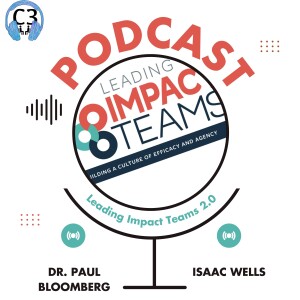
Wednesday Jan 03, 2024
Leading Impact Teams 2.0 with Dr. Paul Bloomberg and Isaac Wells
-Leading Impact Teams: Building a Culture of Efficacy and Agency -New book - we wanted to share more of the explicit ‘how', as well as making sure equity is up front and present in this edition. It is infused with culturally responsive sustaining education practices that are asset based, where we look at assessments through the theme of culture. We all have different cultures and are coming together in a classroom. We can honor the cultures of the different people within our classrooms or we can deny them and assimilate and be one. It is better if we honor each person's cultural backgrounds and we make more connections and we learn more.
-What is inquiry? What is it and what is it not? If we want our students to have agency, then our teachers have to have agency too, all while meeting school goals but having flexibility. How are we going to contribute back to where and how we learn?
-At Core Collaborative we practice what we teach. We are always learning and reflecting. We are taking input from so many different sources, a massive learning community.
-Efficacy’s 4 sources: safety, models of success/success criteria, feedback, and mastery moments. Agency is the opportunity and ability to take control of your own life. To make decisions that help yourselves and help others. Looking towards collective teacher efficacy.
-Teachers have influence and agency over their classroom. Goal consensus, teachers gathering with the principal. Are we actually looking at the data collaboratively together, brain storming what our goals could be as teachers, and creating those goals collectively? Having cohesion, where are we going three years from now? We need agency over what we are doing within our schools. Are our interventions quality? Self efficacy moving to teacher collective efficacy.
-Design thinking to enhance PLC work. Starts with the core, empathizing with your client- your students, parents, and teachers. We started doing a lot more empathetic interviews to be better and be able to understand the root cause of the problem because we were talking to the people who the problem mostly impacted. Empathy and prototyping phases really set this inquiry apart. This work really excelled our work within high school PLCs.
-We have to honor parents on their terms, honor their culture and the way they see education. We need not to make it about what we need, but about what do you need? What can we do better for you?
- As educators, we need to acknowledge the cultural strengths that kids already have. These strengths can be used as a source of knowledge to build from. The asset based approach is vital.
-They are already whole. We have to speak about them as whole people. No one in the room is broken, you all are totally whole. The system is broken. The more that we look at our deficits, the more we find.
-Learning is a partnership and it happens socially before it happens academically. At the heart of the model is to develop self empowered learners and that is another way to think of agency. Students who are able to live in the world with a belief that they can have an impact on their lives and the lives of others with the power and spirit to take chances and try that.
-Teaching kids how to learn to learn.The better you understand yourself, the better you are able to understand others.
Connect with Peter and Isaac:
@thesocialcore or @corecollaborative
Facebook - Search Leading Impact Teams
No comments yet. Be the first to say something!